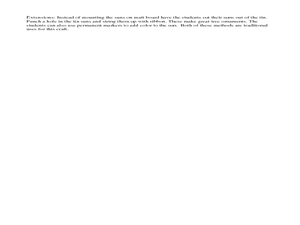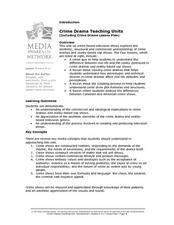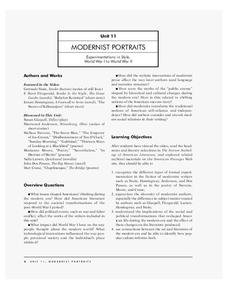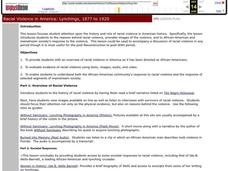Curated OER
First Nations Contributions Grade 12
Twelfth graders investigate the contributions of the First Nations and Metis to Canadian society. In this native studies lesson, 12th graders complete handouts that require them to recognize native contributions in education, governance,...
Curated OER
An Academic, Economic, Cultural, and Political Lesson Plan
Students reflect on how many board games they've played have African Americans, their culture or history incorporated within. They identify four street games and three card games that appeal to African Americans. They play the...
Curated OER
Tin Relief
Young scholars create a sun tin relief sculpture. In this Mexican art lesson, students incorporate line and form into a relief sculpture that they create of the sun.
Curated OER
Frederick Douglas
Fourth graders explore the African Americans resistance to slavery. For this US History lesson, 4th graders read excerpts of a speech by Frederick Douglas.Students develop a position of right or wrong to certain situations within their...
Curated OER
Breaking the Color Barrier: Jackie Robinson's Combat Against Racism
Students explore Jackie Robinson's career. In this 20th century American history lesson, students complete the provided analysis questions based on the provided primary documents about Jackie Robinson. Students discuss Jackie' Robinson's...
Curated OER
Rights in Early America
Get your historians to hop into someone else's 18th century shoes with a simulation on rights in early America. Each individual gets an identity card, indicating their race, gender, and status (slave or free). Areas around the room are...
Curated OER
Crime Drama Teaching Units
Investigate the nature of crime dramas on television. What exactly are they trying to portray? Questions and a comparison chart support learners as they watch shows from Canada, Great Britain, and the United States. An oral presentation...
Curated OER
Jazz in America Lesson Plan 7
Students survey free jazz and fusion. They explore how free jazz and fusion reflected American culture and society in the 1960s and 1970s.
Curated OER
The Great Depression and Everyday Life
Examine everyday life during the Great Depression, as well as the effects if the Depression on American population, society, and economy. Learners write who, what, where, when, and why summaries of a person who relocated to California...
Curated OER
Voice of History
Way before the digital age radio was the medium of popular culture. After listening to excerpts from radio programs (easily available on the Internet), participants return to the radio age by creating a two-minute sketch based on a...
National Endowment for the Humanities
Revolution '67, Lesson 1: Protest: Why and How
To some people, protesting is as American as apple pie, but the factors that lead to protests can be as confusing to veteran activists as to today's youth. Revolution '67 explores the riots in Newark, New Jersey as a case study. Using...
PBS
Amelia Earhart: Aviator, Record-Breaker, and Activist
Fly through the gender barrier! Scholars investigate the impact Amelia Earhart had on American aviation and society. After watching a brief biographical video, learners take a look at primary documents to gain insight into her intriguing...
State Bar of Texas
Worcester v. Georgia
Can the president of the United States defy the rulings of the Supreme Court? Students investigate the case of Worcester v. Georgia and the impact it had on society and, most importantly, Native Americans. Using a short video clip as...
Council for Economic Education
Inflation Data: Is the Economy Healthy?
What stories do current trends tell about society, fashion, and the future? Scholars investigate the concept of inflation and its impact on the future of the American economy. They compile current economic data to determine the level of...
College Board
2003 AP® English Language and Composition Free-Response Questions
How does perspective change a person's view? Scholars view different perspectives as they compare the styles of two different authors describing a flock of birds. Writers also create essays in response to entertainment ruining society...
PBS
The Meaning of the Fourteenth Amendment
The Fourteenth Amendment was extremely important to civil rights and is a crucial one to remember. The resource teaches about the Supreme Court decisions related to the amendment through writing exercises, reading, and working in small...
Smithsonian Institution
Changing Gender Roles on the Home Front
Many historians discuss how gender roles changed because of World War II, but how did this come to be? An informative resource challenges scholars to do some digging and research the information for themselves. They research how...
Annenberg Foundation
The Search for Identity
Discover how writers express identity in their writing. Learners explore how issues of identity surface in the literature of minority writers. Scholars watch a video, read and discuss biographies, conduct research, engage in creative...
Annenberg Foundation
Modernist Portraits
How did literature reflect people's attitudes in post-World War I America? A lesson explores the topic using a variety of activities. Individuals watch and respond to a video; read author biographies and engage in discussion; write...
Global Oneness Project
Repairing the Fabric of Democracy
During elections, headlines constantly lament the issue of low voter turnout. Help class members understand why this is such an important topic with relevant articles, a discussion of both sides of the issue, and a reflective essay.
Crafting Freedom
Harriet Jabocs and Elizabeth Keckly: The Material and Emotional Realities of Childhood in Slavery
Learning how to make accurate inferences by putting together facts found in multiple sources is one of those skills all learners must develop, but one that can be a challenge to teach. This resource is a must-have for your curriculum...
Crafting Freedom
Harriet Jabocs and Elizabeth Keckly: The Material and Emotional Realities of Childhood in Slavery
Through the journals written by Harriet Jacobs and Elizabeth Keckly, young readers gain insight into the lives of two enslaved children on nineteenth-century plantations.
Curated OER
Racial Violence in America: Lynchings, 1877 to 1920
Students analyze racial violence in America. Students listen to interviews with survivors of racial violence. They discuss the reasons behind the violence. Students explore the African-American community's response to racial violence and...
Curated OER
Stand Up and Sing
Students journal and respond to the question," How does society respond to change?" They create original lyrics to their own song that reflects the context of the Progressive Era.
Other popular searches
- American Society and Values
- Schools in American Society
- Vietnam and American Society
- Native American Society
- In the American Society
- North American Society
- Cultures in American Society

























